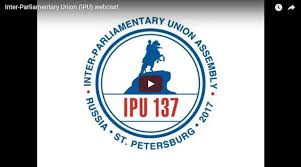 The Inter-Parliamentary Union (IPU), which is convening its 137th General Assembly in St. Petersburg, Russia, has approved Morocco’s proposal to include on the agenda an emergency item on the ongoing humanitarian crisis of the Rohingya, Burma’s Muslim minority.
The Inter-Parliamentary Union (IPU), which is convening its 137th General Assembly in St. Petersburg, Russia, has approved Morocco’s proposal to include on the agenda an emergency item on the ongoing humanitarian crisis of the Rohingya, Burma’s Muslim minority.
The Moroccan proposal, supported by Indonesia, the United Arab Emirates, Bangladesh, Kuwait, Iran, Sudan and Turkey, won 1,027 votes, according to the official news agency MAP.
The 1,700 MPs participating in the IPU Assembly welcomed the proposal because of the suffering, persecution, discrimination and displacement endured by the Rohingya minority.
A statement from the Moroccan House of Councilors, which is represented at the IPU General Assembly, had announced that the Moroccan delegation made a proposal in the framework of a discussion on the theme: “The fight against violence and discrimination against the Rohingyas in Myanmar: Inter-Parliamentary Union”.
“The choice of this theme by the Moroccan Parliament confirms the Kingdom’s constant position with regard to the humanitarian crisis faced by the Rohingya minority in Myanmar,” the statement had stressed.
Last month, Morocco, upon instruction of King Mohammed VI, had sent an emergency humanitarian assistance to alleviate the sufferings of this Muslim minority and support the efforts made by neighboring Bangladesh, which is providing shelter to them.
More than 500,000 people have fled Burma and joined the over one million Rohingyas that have already taken refuge in Bangladesh to escape the violence and discrimination they have suffered in the Mykonian region of Arakan for decades.
The UN is to hold on October 23 a pledging conference to “send a strong message to Rohingya refugees and their generous hosts in Bangladesh that the world is there for them in their greatest time of need.”
“We call on the international community to intensify efforts to bring a peaceful solution to the plight of the Rohingya, to end the desperate exodus, to support host communities and ensure the conditions that will allow for refugees’ eventual voluntary return in safety and dignity,” the UN Office for the Coordination of Humanitarian Affairs (OCHA), the International Organization for Migration (IOM) and the Office of the UN High Commissioner for Refugees (UNHCR) said in a joint statement Monday.
“The origins and, thus, the solutions to this crisis lie in Myanmar,” added the UN High Commission for Refugees, Filippo Grandi, the UN aid chief, Mark Lowcock, and the Director General of IOM, William Lacy Swing.


